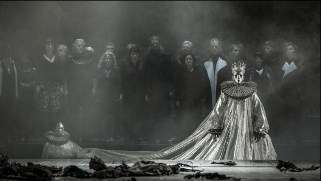|
Back
The Witches’ Cave, the Usurper’s Hell Prague
National Theatre
07/02/2019 - & December 5, 29, 2018, February, 13, 21, June 21, 2019
Giuseppe Verdi: Macbeth
Martin Bárta*/Michele Kalmandy/Anton Keremidtchiev (Macbeth), Anda-Louise Bogza*/Jolana Fogasová (Lady Macbeth), Milos Horák/Roman Vocel* (Banco), Jaroslav Brezina/Kyungho Kim/Martin Srejma* (Macduff), Václav Sibera (Malcolm), Ivo Hrachovec*/Lukás Hynek-Krämer (Doctor), Lucie Hájková/Lucie Silkenová* (Lady in Waiting)
Sbor Národniho divadla, Pavel Vaněk (chorus master), Orchestr Národního divadla, Jori Strunc (conductor)
Martin Cicvák (stage director), Hans Hoffer (sets), Marja Havran (costumes)

(© Patrik Borecký)
Premiered in 1847, Macbeth preceded Verdi’s triumphant middle period trio of Rigoletto, Il trovatore and La traviata, and yet it is superior to his earlier operas and to many subsequent ones. This was perhaps Verdi’s first opera with a truly strong libretto, Piave’s inspired adaptation of Shakespeare’s powerful play. For the first time in Verdi’s output, we are far from chirpy bel canto tunes and into well-defined characters.
Such an inspired work is fertile ground for stage directors, and Martin Cicvák’s staging did not disappoint. The bleak sets did not deter, but actually accentuated the usurper’s tragedy. Central to Cicvák’s concept is the ceiling of a cave that first appears at the opening of the opera during Macbeth’s initial encounter with the witches. This ceiling remains throughout the opera and gradually comes down as the drama progresses, reflecting Macbeth’s increasing paranoia. Intermittently, fumes emanate from the ground evoking the netherworld, as the weak but ambitious Macbeth is in a living hell from beginning to end. Martin Cicvák’s staging makes this central idea exceedingly clear.
Obviously, a strong Macbeth and Lady Macbeth are essential to the success of the opera. Happily, both Martin Bárta and Anda-Louise Bogza were close to ideal. Both are gifted singers as well as excellent actors. Martin Bárta is a true Verdi baritone with a beautiful Italian sound. His stage presence and posture is regal. Yet, without excessive histrionics, he manages to convey Macbeth’s weaknesses, through his singing and subtle gestures.
In her final scene before collapsing, Anda-Louise Bogza is convincingly mad, for “Una macchia č qui tutt’ora” (the Sleepwalking Scene) is indeed a mad segment, and a considerably darker one than the familiar bel canto mad scenes. In creating the role, it is said that Verdi wanted una voce brutta (an ugly voice) to convey the woman’s malevolence. It would be unkind to define Bogza’s voice as ugly, but it has a metallic harsh edge which accentuates Lady Macbeth’s ruthlessness. In addition to a great voice, this fine Romanian soprano also has perfect Italian diction. Her opening Act I Letter Scene, “Nel dě della vittoria...Vieni t’affretta!” is demanding both vocally and dramatically. Her reading of Macbeth’s letter sets the tone and clearly defines her. Ruthless ambition, immediately followed by her doubt, were marvellously conveyed in the phrase “Tu sei Macbetto...Alla grandezza anelli, ma sarai tu malvagio?”
The witches, while not scary, were memorable. With horns on their heads and furry legs, they looked unearthly but sounded glorious. The chorus, whether the witches, the courtesans or the oppressed people, was well-rehearsed and performed with an even clearer diction than some of the secondary soloists.
Martin Srejma’s Macduff was excellent, for his is a sweet lyric tenor with brilliant high notes. He’s also intoxicatingly expressive, perfectly capable of conveying his grief as well as his fury and thirst for revenge. Less impressive was Roman Vocel’s stiff Banco (Banquo), whose Italian diction was peculiar, never singing open vowels, making his passages unintelligible and devoid of legato. Vaclav Sibera’s Malcolm was underwhelming. His voice was too small even for this relatively minor role. When he sang the Act IV duet with Macduff, it was more a duet for tenor and tenorino than a duet for two tenors.
Mention is deserved of Lucie Silkenová, who managed to make her minor role of Lady in Waiting seem major, thanks to her amazing stage presence. Some brilliant choreography was devised for her and the courtesans in Act II’s Banquet scene when Macbeth acts incoherently as he sees the ghost of the recently murdered Banco. Dressed in an executive secretary’s short dress, a hysterical and rigidly stiff Silkenová directs the courtesans in initially convincing gestures of approval. As Macbeth becomes more incoherent, she loses control and the crowd’s gestures become more scornful than approving. With this manoeuvre, stage director Martin Cicvák brilliantly and succinctly exposed the usurper’s malaise and the people’s brewing rebellion. The transposition to a contemporary setting does not always work, especially if one pays close attention to the text. Yet, greed and the hunger for power are such contemporary themes that this production is welcome. Hans Hoffer’s spartan but effective sets proved that for strong, well-written drama, especially in the hands of an innovative stage director, less can indeed be more.
Ossama el Naggar
|